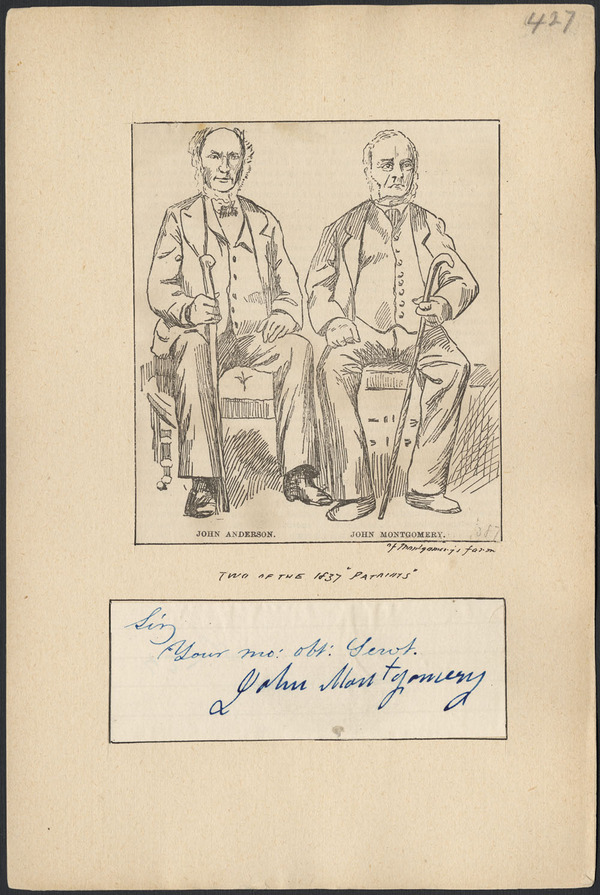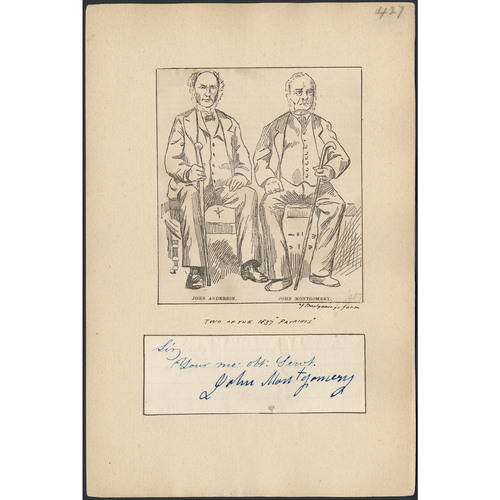MONTGOMERY, JOHN, tavern-keeper; b. probably 29 Feb. 1788, at Gagetown, N.B., son of Alexander Montgomery; d. at Barrie, Ont., 31 Oct. 1879.
John Montgomery’s parents left Stamford, Connecticut, for New Brunswick after the American Revolutionary War, and in about 1798 settled at York (Toronto); Upper Canada. John served in the War of 1812 as a York volunteer on the Niagara frontier, and was present at the battle at Queenston.
Alexander Montgomery had established a tavern at York soon after his arrival, and in 1828 John was keeping the Bird in Hand Tavern, also at York. In the same period he operated a tavern on Yonge Street near Newton Brook (now in the borough of North York). About 1830 he erected Montgomery’s Tavern on Yonge Street, a few miles north of York.
Montgomery had sympathized with the Reformers in Upper Canada, perhaps as early as 1824. In 1832 he helped send William Lyon Mackenzie* to England to present petitions to the Colonial Office, and he was later among the Reformers who founded the Bank of the People. He was also a commissioner for the roads of York County and a director of the Mutual Insurance Company. In July 1837, on the eve of the rebellion in Upper Canada, he signed at John Doel’s brewery a declaration of Toronto Reformers and was a member of a vigilance committee named to carry out its resolutions aimed at creating “the efectual organization of the Reformers of Upper Canada.” He appears, however, to have quarrelled with Mackenzie, disapproving of the latter’s plans for open rebellion.
On 3 December he was informed that his tavern would be the headquarters for the rebels, and was asked to act as commissary. But Montgomery had leased his tavern to John Linfoot by this time. Linfoot was to take possession of the tavern on 1 Feb. 1838, but had moved in on 1 December. While the rebel forces were assembling, Montgomery continued living in one of the rooms of the tavern and was said to have been occupied mainly with moving furniture to his new home. Although he apparently took no active part in the activities of the rebels and is said to have quarrelled at the tavern on one occasion with Mackenzie, his conduct was found at his trial to have been ambivalent.
On 7 December government forces reached the tavern and burned it on the orders of Francis Bond Head. Montgomery was arrested, and charged with high treason. Tried before John Beverley Robinson*, he was found guilty and sentenced to be executed, but this sentence was commuted to transportation for life. Montgomery was sent to Fort Henry; he escaped and made his way to Rochester, New York, where he kept a boarding-house, which became a rendezvous of Canadian Patriots, and a grocery store. He was again closely associated with Mackenzie at Rochester and was president of an association for Canadian refugees.
Montgomery was pardoned and returned to Toronto in 1843. He built a large new tavern on the site of the old on Yonge Street, and later operated taverns in Toronto itself; in 1858 he was proprietor of the Robinson House, a “temperance hotel” where liquor was not sold. In 1871 he moved to Headford, in Markham Township, where he was postmaster. Soon after his return to Canada he had submitted the first of a long series of petitions requesting compensation for the loss of his tavern in 1837. He enlisted Mackenzie’s help, but only in 1873 was action taken; in that year, Oliver Mowat*’s government established a select committee of the Legislative Assembly which decided that Montgomery’s losses had exceeded $15,000; it awarded him $3,000.
Montgomery was married three times, but only the name of Mary Wilmot, whom he married in 1835, is known. When he died in 1879 he was survived by his third wife and six children. He claimed that at his trial, when asked by Robinson if he had anything to say, he replied that he had been convicted by perjured evidence and that “These perjurers will never die a natural death; and when you, sir, and the jury shall have died and perished in hell’s flames, John Montgomery will yet be living on Yonge Street.” If the prophecy was made, parts of it did come true: two men killed themselves, and Montgomery outlived judge, jurors, witnesses, and prosecutors.
PAO, Mackenzie-Lindsey collection, clippings, no. 305; Misc. 1959, E. A. Lacey, “John Montgomery, a miscarriage of justice.” Globe (Toronto), 15 Jan. 1876. Picton Times, 29 Jan. 1880. Dent, Upper Canadian rebellion. E. C. Guillet, The lives and times of the Patriots; an account of the rebellion in Upper Canada, 1837–1838, and the Patriot agitation in the United States, 1837–1842 (Toronto, 1938); Pioneer inns and taverns (5 v., Toronto, 1954–62), I. E. A. Lacey, “The trials of John Montgomery,” Ont. Hist., LII (1960), 141–58. Mrs O. B. Sheppard, “Incidents in the life of John Montgomery during the rebellion of 1837–38,” York Pioneer and Hist. Soc., Annual Report, 1926 (Toronto), 11–15.
Cite This Article
Edwin C. Guillet, “MONTGOMERY, JOHN (d. 1879),” in Dictionary of Canadian Biography, vol. 10, University of Toronto/Université Laval, 2003–, accessed May 30, 2025, https://www.biographi.ca/en/bio/montgomery_john_1879_10E.html.
The citation above shows the format for footnotes and endnotes according to the Chicago manual of style (16th edition). Information to be used in other citation formats:
| Permalink: | https://www.biographi.ca/en/bio/montgomery_john_1879_10E.html |
| Author of Article: | Edwin C. Guillet |
| Title of Article: | MONTGOMERY, JOHN (d. 1879) |
| Publication Name: | Dictionary of Canadian Biography, vol. 10 |
| Publisher: | University of Toronto/Université Laval |
| Year of revision: | 1972 |
| Access Date: | May 30, 2025 |




